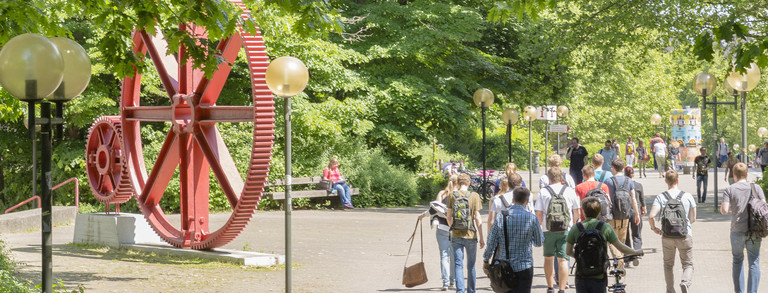Citylife - Integrated approach to lifestyles, residential milieux, space and time for a sustainable concept of mobility and cities" (2001-2005)
In the debate on the future of the city, lifestyles, housing styles, mobility styles and other target group oriented approaches have recently gained importance. They have been introduced into urban research and spatial planning in the context of individualisation and globalisation. The starting point in this context is the idea of an increasing societal differentiation, specifically with respect to lifestyles, individualisation, shrinking household sizes and pluralisation of household types, biographies and, more generally, life situations. In market research, target group approaches have been a long standing mainstream instrument. But are they relevant for planning? This and other questions have been addressed by the project StadtLeben, based on a case study of ten neighbourhoods in the urban region of Cologne.
The project focused on the complex conditions which spatial research and planning have to face in contemporary societies. The societal change has led to increased chances of self-realisation for many an individual. At the same time, time structures, land-use and the built environment in general have developed dynamically (keywords: decentralisation, flexibilisation…). Thus, essential conditions for travel demand have changed considerably. The trends are at least partially incompatible with the perspective of sustainable urban development.
The project aimed to improve our understanding of such processes and structures as a basis for the development of planning schemes for sustainable urban development. In doing so, the interrelations between lifestyles, residential milieux, and spatial mobility have been explored, as well as the complex interrelations between residential mobility and travel behaviour. Based on this approach, target group oriented and efficient strategies for planning and design may be developed. In cooperation with planning practitioners, practical knowledge was derived with respect to planning goals as well as planning procedures (participation, processes, competence).
The project results were presented and discussed at the conference "StadtLeben – lifestyles, residential milieux, and space-time-structures – New perspectives for mobility and urban development?" in Dortmund on February 24th and 25th, 2005. Approximately 80 researchers as well as experts from planning institutions, the real estate industry, and transport providers attended the conference. Besides the presentation of key project results, experiences and views have been exchanged in three working groups:
- Lifestyle, life cycle, household type – the benefit of social differentiation for travel/mobility research
- The interrelations between housing, daily mobility and space
- The relevance of lifestyle research for planning practice
The results suggested on the one hand that lifestyle research may deliver additional knowledge for practical tasks in planning, e.g. by improving our understanding of the needs of various population groups, as compared to groups based on socio-demographic variables. On the other hand lifestyle surveys require high effort and, not least, expenditure.
The relationship between residential mobility, location choice and travel behaviour has been another focus. For instance, relocating from a city to the periphery, or vice versa, is connected to considerable changes in motorisation and travel mode choice. At the same time, such changes are clearly connected to changes in the household structure (e.g. the birth of children, founding a household with the partner, divorce…). Such changes may be key events for mobility biographies.
The project was executed at the transport research group, Department of Spatial Planning.
Cooperation partners:
Fachgebiet Verkehrswesen und Verkehrsplanung (Prof. Dr.-Ing. Christian Holz-Rau, Prof. Dr. Joachim Scheiner)
Institut für Stadtbauwesen und Stadtverkehr, RWTH Aachen (Prof. Dr. Klaus J. Beckmann, Projektkoordination),
Psychologisches Institut, Ruhr-Universität Bochum (Dr. Marcel Hunecke)
Geographisches Institut, Freien Universität Berlin (Dr. Markus Hesse)
Funding: German Federal Ministry of Education and Research (www.bmbf.de)
Executive organisation: Mobility and Transport, Building and Housing (www.tuvpt.de, www.wohnzukunft.net)
The project is part of the research programme 'Housing and building' of the German Federal Ministry of Education and Research
Contact
Prof. Dr. Joachim Scheiner, joachim.scheiner@tu-dortmund.de, Tel.: 0231 755-4822
Publications
Hesse, Markus / Scheiner, Joachim (2009): Residential Location, Mobility and the City: Mediating and Reproducing Social Inequity. In: Ohnmacht, Timo / Maksim, Hanja / Bergman, Manfred Max (eds): Mobilities and Inequality. Transport and Society book series. Aldershot: Ashgate. S. 187-206.
Scheiner, Joachim (2008): Lebensstile in der Innenstadt – Lebensstile am Rand: Wohnstandortwahl in der Stadtregion. In: Deutsche Zeitschrift für Kommunalwissenschaften 47(1), S. 47-62.
Beckmann, Klaus J. / Hesse, Markus / Holz-Rau, Christian / Hunecke, Marcel (Hrsg., 2006): StadtLeben – Wohnen, Mobilität und Lebensstil. Neue Perspektiven für Raum- und Verkehrsentwicklung. Wiesbaden: VS Verlag.
Scheiner, Joachim (2006): Housing Mobility and Travel Behaviour: A Process-Oriented Approach to Spatial Mobility. Evidence from a New Research Field in Germany. In: Journal of Transport Geography 14(4), S. 287-298.
Scheiner, Joachim (2006): Does Individualisation of Travel Behaviour Exist? Determinants and Determination of Travel Participation and Mode Choice 1976-2002. In: Die Erde 137(4), S. 355-377.
Scheiner, Joachim / Kasper, Birgit (2005): A Lifestyles Approach to Investigating Residential Mobility and Travel Behaviour. In: Williams, Katie (Hg.): Spatial Planning, Urban Form and Sustainable Transport. Aldershot: Ashgate. S. 42-60.
Scheiner, Joachim (2005): Auswirkungen der Stadt- und Umlandwanderung auf Motorisierung und Verkehrsmittelnutzung: ein dynamisches Modell des Verkehrsverhaltens. In: Verkehrsforschung Online 1(1), S. 1-17.

